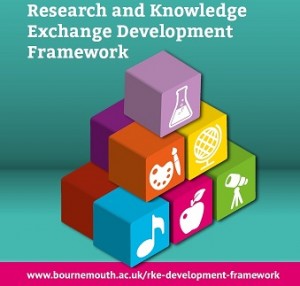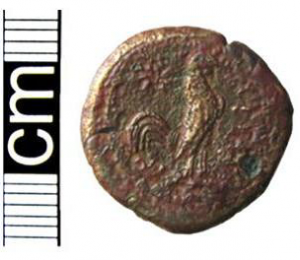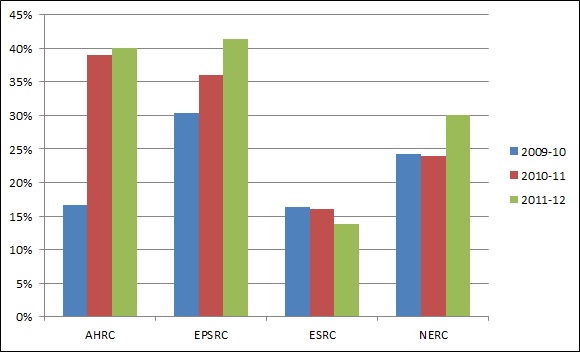BU has had an unprecedented amount of success in 2016-17 with four successful applications being funded by three research councils (combined value ~£1m). The successful BU awards are:
 AHRC – Re-presenting para-sport bodies: Disability & the cultural legacy of the Paralympics (Prof Michael Silk)
AHRC – Re-presenting para-sport bodies: Disability & the cultural legacy of the Paralympics (Prof Michael Silk)- ESRC – Sex work in the context of sports mega events: Examining the impacts of Rio 2016 (Prof Michael Silk)
- NERC – Mechanisms and consequences of tipping points in lowland agricultural landscapes (Prof Adrian Newton)
- NERC – Freshwater Taxonomy and Field Identification Skills (Prof Genoveva Esteban) (the decision was made at the end of March but I’m presuming that this will be included in the 16-17 figures as it did not appear in 15-16, as shown below)
BU’s success rate in 2014-15 (the coverage is decisions made between April 2015 to March 2016) was a respectable 17% with two bids awarded out of the 12 submitted; and in 2013-14, BU’s success rate was 33%, also based on 12 applications. Although the success rate for 2015-16 decreased to 9% with one bid awarded out of 11, the average awarded across the sector was £56k with BU’s being an impressive £216k. It is still one of BU’s highest annual success rates with the research councils. The sector average success rate in 2015-16 has continued to decline slightly, from 28% to 26% (it was 30% in 13-14), which means the success rate that BU has already achieved in 2016-17 is likely to be higher than the sector average. The successful BU award for 2015-16 was:
 ESRC – Reducing Spatial Disorientation in Dementia Care Homes (Dr Jan Wiener)
ESRC – Reducing Spatial Disorientation in Dementia Care Homes (Dr Jan Wiener)
The sector average success rate with ESRC was only 12%, compared to BU’s impressive 50%. Also, BU has had more grants awarded from the Research Councils over the past year than are reported here, however, the official stats only show results against the lead institution so successful bids where BU is the collaborating institution are not shown against BU in the data above.
 BU is especially keen to increase the quality of bids submitted to Research Councils and RKEO have recently launched the R&KE Development Framework, which offers a range of opportunities for academics at all career stages to develop their skills, knowledge and capabilities in relation to research and knowledge exchange. The framework offers a number of pathways grouped around key topics. As well as including many options for an academic career, they also offer opportunities to support you to design, write and structure competitive, fundable research proposals and to maximise your chances of being awarded funding. Anyone considering submitting a bid to a research council should speak with their Research Facilitator as early on in the process as possible. The Research Facilitators have extensive experience of reviewing research proposals and can provide you with expert guidance on how to shape your bid. You can also access guidance documents on the Research Blog here: http://blogs.bournemouth.ac.uk/research/researcher-toolbox/research-funders-guide/
BU is especially keen to increase the quality of bids submitted to Research Councils and RKEO have recently launched the R&KE Development Framework, which offers a range of opportunities for academics at all career stages to develop their skills, knowledge and capabilities in relation to research and knowledge exchange. The framework offers a number of pathways grouped around key topics. As well as including many options for an academic career, they also offer opportunities to support you to design, write and structure competitive, fundable research proposals and to maximise your chances of being awarded funding. Anyone considering submitting a bid to a research council should speak with their Research Facilitator as early on in the process as possible. The Research Facilitators have extensive experience of reviewing research proposals and can provide you with expert guidance on how to shape your bid. You can also access guidance documents on the Research Blog here: http://blogs.bournemouth.ac.uk/research/researcher-toolbox/research-funders-guide/
Read more about the demand management measures that the Research Councils have put in place here: Demand Management. As the councils are still seeing an increase in applications received alongside declining success rates then there is a possibility that demand management requirements will be stepped up in future.






















 Beyond Academia: Exploring Career Options for Early Career Researchers – Online Workshop
Beyond Academia: Exploring Career Options for Early Career Researchers – Online Workshop UKCGE Recognised Research Supervision Programme: Deadline Approaching
UKCGE Recognised Research Supervision Programme: Deadline Approaching SPROUT: From Sustainable Research to Sustainable Research Lives
SPROUT: From Sustainable Research to Sustainable Research Lives BRIAN upgrade and new look
BRIAN upgrade and new look Seeing the fruits of your labour in Bangladesh
Seeing the fruits of your labour in Bangladesh ECR Funding Open Call: Research Culture & Community Grant – Apply now
ECR Funding Open Call: Research Culture & Community Grant – Apply now ECR Funding Open Call: Research Culture & Community Grant – Application Deadline Friday 12 December
ECR Funding Open Call: Research Culture & Community Grant – Application Deadline Friday 12 December MSCA Postdoctoral Fellowships 2025 Call
MSCA Postdoctoral Fellowships 2025 Call ERC Advanced Grant 2025 Webinar
ERC Advanced Grant 2025 Webinar Update on UKRO services
Update on UKRO services European research project exploring use of ‘virtual twins’ to better manage metabolic associated fatty liver disease
European research project exploring use of ‘virtual twins’ to better manage metabolic associated fatty liver disease